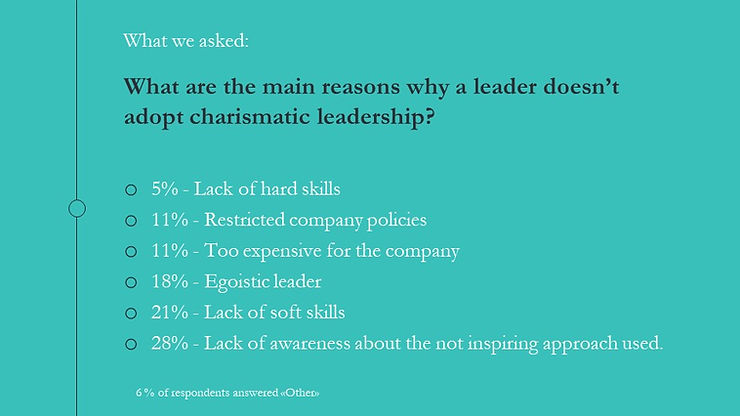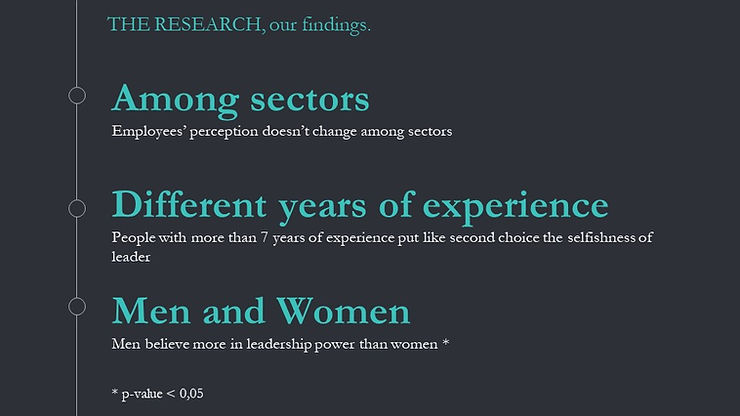
Charismatic Leadership in Italy
According to a Gallup’s survey, done among more than 30.000 employees in US, 53% of people are “Not engaged” at work, it means that they are not cognitively and emotionally connected to their work and 13% of people are “Actively disengaged”, for them is a nightmare to go to work.
Impacts of disengagement can be devasting. Think that organizations that are the best in engaging their employees achieve earnings-per-share growth that is more than four times that of their competitors.
How can it be so impactful? Because, if people are engaged in what they do, they will perform much better. From the company point of view, we could have:
• Better customer engagements
• Higher productivity
• Better retention
• Fewer accidents
• 21% higher profitability
So, how could we realize that? Thanks to many studies over the years, we know that charismatic leadership, also known as transformational leadership, could improve employee’s engagement and therefore the company’s performance. We are talking about a leader who can implement:
• Idealized influence
• Inspirational motivation
• Intellectual stimulation
• Individualized consideration
These are the research questions that guided Diego Giuseppe Ianni in his work: “How is the situation in Italy about employees’ engagement? Is charismatic leadership implemented? If not, why?”
Why just charismatic leadership? Because people respond better to a kind of leadership that best fits their values and values change among countries. But charismatic leadership is the one which has common points among the values of many countries.
Here is the sample: 190 respondents, including 53% female and 47% male, from 8 different sectors, with 3 levels of experience and coming from companies of 4 different sizes.

Unfortunately, the study revealed that the situation in Italy is even worse than in the US. 50% of our respondents do not feel stimulated at work, which means 5 people to 10 has no desire to go to work. 53% do not feel enthusiastic, which means that 5 people to 10 don’t respond to stimuli. and 85% of them said it depends on leadership, so it means it could be improved.
94% of our respondents said that charismatic leadership traits are important for a leader, so it means that they would accept it and therefore they would respond well to it. Just 40% of the employees interviewed think that their leader is a charismatic one.
So, we asked to our respondents why, according to them, a leader doesn’t adopt a type of management that could improve the employees’ performance and company performance. Here are the responses:
• 5% of them think that is due to a lack of hard skills
• 11% think that is due to restricted company policies or because of costs for the company
• 18% of them said that their leaders are too focused on their personal career
• 21% of our respondents think is a problem of lack of soft skills. They think that their leaders are not able to listen, to motivate, to inspire and to be emphatic.
• But the worst thing is that the 28% of the sample thinks that it is due to a lack of awareness about how much their approach is not inspiring. It means that 3 out of 10 leaders are not aware of what they are causing and how a change in the type of management could improve the overall situation.

Crossing the data through a frequency analysis we found out also that what employees think about their leaders don’t change among different sectors, it means that the leadership doesn’t depend on technical things, and the charismatic one could be implemented in a transversal way.
Also, we noticed that people with more than 7 years of experience think more than others that leadership problems come from selfishness, we think that this pessimistic view comes from having experienced years with bad leaders.
Finally, through a t-test analysis with a significance of 95%, p-value<0.05, we discover that men believe more in leadership than women, which means that men are more propense to follow leadership than women.

In conclusion, up to now we have talked about performance and profitability, but our study had the aim to raise manager’s awareness about leadership, to make them understand that it is people we are talking about.
People like us, who have insecurities, fears, and problems to overcome.
Few measures could improve and impact their lives in a very positive way.
Treat them as they are: human.


